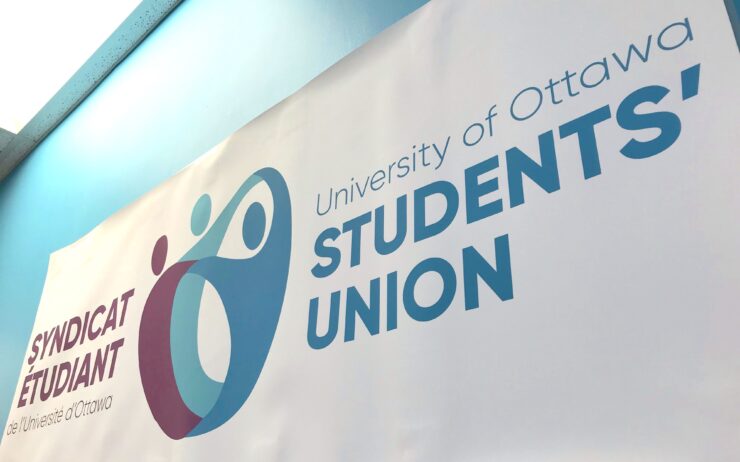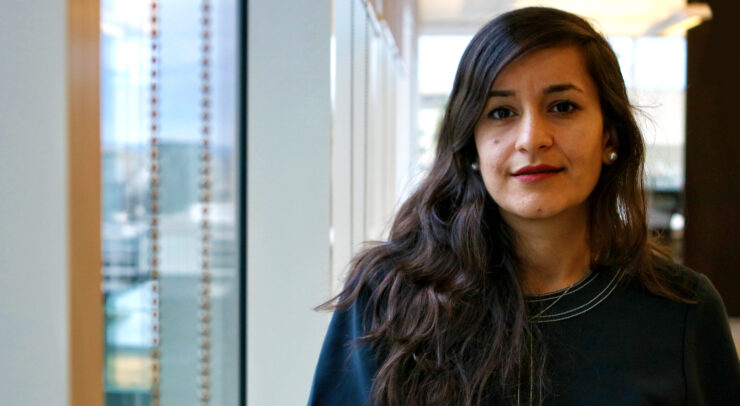Student services commissioner also being added, bringing executive to seven people
The University of Ottawa Students’ Union (UOSU) voted to shift its executive structure at a Board of Directors (BOD) meeting on Sunday, resurrecting the president position and adding a student services commissioner to its leadership team.
The meeting in the Tabaret Hall Senate Chamber also saw discussion on the union’s recent decision to strip an anti-abortion group on campus of its club status, blocking them from accessing resources and funding through the UOSU. However, the group can still remain active on campus.
An interim faculty of arts director was appointed to the board, an electoral code and updated budget were both approved, and a linguistic policy and attendance policy for board members were both passed at the meeting as well.
UOSU adds president position, student services commissioner
Undergraduate students will be met with two new positions on the executive of the UOSU when they head to the polls for the union’s annual general elections in the coming months.
After hours of debate at Sunday’s BOD meeting, the UOSU ultimately voted to pass a motion to add a president and a student services commissioner to its executive structure, bringing the total number of seats at the top of the union to seven. The roles of some existing commissioners and committees will also shift slightly.
Under the amendments to the UOSU’s constitution, brought by the governance committee and introduced by advocacy commissioner Sam Schroeder, the president will supervise the overall operations of the union and manage all human resources matters.
Meanwhile, the student services commissioner will oversee the operations of the UOSU’s services, and programs aimed at recognized clubs.
While introducing the motion, Schroeder said all commissioners were in favour of the proposed constitutional amendments except for the operations commissioner.
“The issue that we’ve found is that it’s very difficult for there to be leadership within the executive committee and it’s oftentimes very difficult to have a united direction,” said Schroeder. “This is specifically the case when it comes to shared (commissioner) mandates.”
“One of the major issues I’ve found within my own mandate is that there are points in time where I’ve felt a little overwhelmed with the projects I’ve been working on … (and) projects aren’t being done to the full potential that they could be,” added student life commissioner Jason Seguya.
The question of a seven-person executive structure was first brought to the board at the union’s December meeting, but some directors worried there was a lack of consultation surrounding the decision and students might feel undercut by the sudden changes.
Others feared adding a president to the UOSU could introduce a hierarchical structure to the organization and might stir up some of the problems faced by the school’s former undergraduate student union, the Student Federation of the University of Ottawa, leading the board to table the motion until Sunday’s meeting.
Much of the same concerns brought up in December were at the forefront of the debate again.
“This type of change, this early in our union, is setting the tone of how we’re going to work in the future,” said faculty of social science director Zaina Hamodah, highlighting a lack of broad student consultation and the number of directors missing from the meeting. “We are not a competent and complete board to be making this decision.”
“I think if we don’t address (the question) this year we’re just going to let a problem grow and grow and grow for the next three or four or five years until a board decides OK, maybe this is something we should address,” said Schroeder. “My fear here is that once that happens … the reaction (from students) is going to be much stronger.”
Faculty of social science director Tim Gulliver shared some of the feedback he heard from students on the proposed changes through a recent town hall.
“I think overall, the room kind of leaned toward the idea that it was better to invest in the system rather than discard the system altogether,” he said.
After about two hours of discussion, the constitutional amendments were brought to a vote and the motion passed with six in favour, four abstaining, and one against.
The new executive structure will take effect for the union’s 2020-21 term but could be overturned at this year’s fall General Assembly. If that happens, the General Assembly could technically vote for the UOSU executive structure to revert back back to its current system immediately, which could put the union in a difficult position.
“If that happens, we’re pretty much screwed,” said faculty of law (common law section) director Daniel Kuhnreich.
Schroeder said the hope is if the fall General Assembly does reject the changes, they’ll vote to revert back to the current executive structure for the 2021-22 term instead.
“I would imagine they would have the good sense to put it off (until then),” said Schroeder.
Appeal of removal of anti-abortion group’s club status tabled to next meeting
Also on the agenda for the meeting was an update on the removal of the club status of an anti-abortion group on campus, U of O Students for Life (UOSFL), which was announced earlier this month.
Student life commissioner Jason Seguya started by outlining the process that led to the removal of UOSFL’s club status, tracing back to October 2019 and culminating in a student life committee meeting in late December.
At that meeting, representatives from UOSFL and pro-choice supporters on campus who petitioned the UOSU for the removal of the club’s status were invited to attend and make their arguments. The committee then voted to revoke UOSFL’s club status, with four voting in favour and one abstaining.
Seguya said the meeting was a learning opportunity for the UOSU and added proposed changes to the union’s club code will hopefully be presented at next month’s board meeting.
Under those amendments, similar meetings in the future will not be scheduled during the exam period, a notice of meetings would be given further in advance, and additional support would be made available to participants, Seguya said.
Time was set out at the BOD meeting for UOSFL to appeal the committee’s decision, but club co-president Garfilia Milousis expressed concerns around a lack of information on the reasoning behind the student life committee’s decision, explaining it made it difficult for her to present a counter-argument.
“My concern from a procedural fairness standpoint is that those reasons that informed your decision, we don’t know what those are,” said Milousis.
Seguya proposed pushing the appeal to the February board meeting. Milousis agreed but requested that information on the reasoning behind the student life committee’s decision and documents relevant to that decision, such as the original petition (without student signatures) be sent to UOSFL prior to the meeting.
Board establishes internal attendance policy for directors, passes linguistic policy
Faculty of social science director Gulliver brought a motion that was tabled due to time constraints at the BOD’s December meeting to establish an internal policy on director attendance.
Under the proposed policy, if a director misses two meetings without providing a written explanation to the chair of the board within the 72 hours following the meeting the chair will meet with the director to request that they commit to attending future meetings or resign from the board altogether. Attendance counts would also be made public under the policy.
“As we all know, there are people who have been on the board since May who have not shown up, who have stopped showing up,” said Gulliver after introducing the motion. On average, about half of board members attended meetings in the fall semester.
The motion passed unanimously with no abstentions.
Also passed was a linguistic policy, outlining the UOSU’s commitment to French and English bilingualism and their policies surrounding internal and external communications.
The policy recognizes that French is the minority language and says it is the UOSU’s responsibility “to represent, defend and ensure respect for the language rights of students within the university community.”
Board passes electoral code, updated budget
An electoral code and an updated UOSU budget both brought by operations commissioner Rony Fotsing were passed at the meeting.
The UOSU has been operating on a provisional electoral code since its inception. The code outlines rules and regulations around nominations, campaigning, debates, and the voting process itself.
With the electoral code now set in stone, the union is expected to launch its annual general election cycle in the next few weeks. In the election, undergraduate students will be able to elect candidates to the UOSU’s seven executive roles and 22 BOD seats.
Under the updated budget, the Racialized and Indigenous Student Experience Centre, the Multifaith Centre, and Campus Vibez uOttawa will see funding boosts. The UOSU says other budget increases will be used to purchase a time management system and equipment for Zoom Production.
Interim faculty of arts director appointed, BOD to meet again next month
Rex Tshibanda, a fourth-year communication and political science student, was appointed as interim faculty of arts director by the board at Sunday’s meeting.
“I want to bring representation for the faculty of arts … and represent all minorities and marginalized communities,” said Tshibanda.
The UOSU’s BOD is set to meet next on Feb. 16, but it will likely be moved because it falls during winter reading week. The union will also hold a town hall focusing on mental health and the club status of UOSFL on Feb. 27 at 6 p.m. in the Agora of the University Centre.





